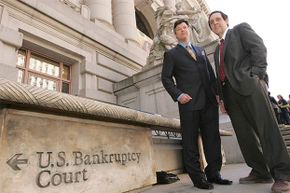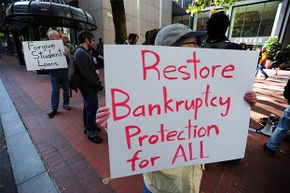Roughly 1 million Americans declare bankruptcy each year [source: U.S. Courts]. While it's easy to dismiss these individuals as people who made bad financial choices -- maxing out credit cards on an unaffordable lifestyle -- the truth is harder; the majority of all bankruptcies are caused by unpaid medical bills, the result of accidents and illness, not overspending [source: LaMontagne].
Even if you're in good financial shape, it's important to understand what bankruptcy is all about. Anyone who pays a mortgage, has a car loan, or uses a credit card needs to know what happens if you are unable to pay back those debts. God forbid you lose your job, get sick, or make a terrible investment decision, at least you'll know that there's a way out of the mess, and it's called bankruptcy.
Advertisement
Keep reading for answers to 10 of the most common questions about bankruptcy, including what the courts can take and what you can keep in the event of a financial disaster. But let's start with a definition.










